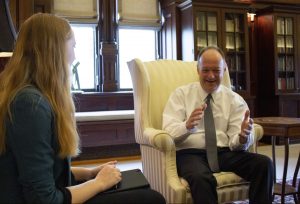Georgetown’s Asian Pacific Islander Leadership Forum (APILF) concluded its three-part summit for an Asian American Studies program on April 15. The summit was sponsored by Asian Americans Advancing Justice (AAJC), a national non-profit aiming to advance civil rights for Asian Americans, and marks a milestone for Asian American Studies at the university.
Students Onrei Josh Ladao (COL’21), Amber Nguyen (COL’22), Katherine Zhuo (SFS’22), Rachael Johnson (COL’22), Lauren Mukae (COL’24), and Angela Nguyen (COL’22) were responsible for leading and organizing last week’s summit. They followed in the footsteps of previous student activists who have pushed for more courses and resources dedicated to the Asian American and Pacific Islander community.
Students who participated in the summit were able to learn about the history of Asian American Studies, engage with faculty on the issue, and generate a plan of action moving forward. The summit takes place at a time of heightened anti-Asian sentiment and an uptick in hate crimes toward people of Asian descent in the United States.
For many students, recent anti-Asian hate highlights another reason for the need for Asian American Studies. “By having the opportunity to learn more about our identities and where we came from, we’re able to track how these identities have been weaponized throughout history in a way that’s being repeated today,” Amber Nguyen said.
Christine So, professor of English and a specialist in Asian American Studies, agrees with their sentiment. “The production of knowledge and the sharing of knowledge about Asian Americans and about race in general is critical to understanding how the United States is at this current moment.”
Other students stressed the importance of additional Asian American Studies courses in understanding their own cultural identity. “Diving into Asian American Studies and understanding my own Asian American identity has helped me make a lot of peace with some of the microaggressions I experienced growing up,” Amanda Yen (COL’23) said, who attended all three sessions of the summit.
Johnson shared the validation she felt when seeing herself represented in her Asian American Literature class. “That was the first time that I saw myself reflected in the things that I was learning in school, and that was something that impacted me so much in just one semester,” she said. “There’s just no words to describe how it feels.”
The push for Asian American Studies in universities across the nation has historically been student-led, beginning in 1968 with the Third World Liberation Front. A coalition of student groups at California universities went on strike and demanded scholarship on the histories of Black, Indigenous, Latinx, and Asian communities in America. The strike lasted several months, becoming one of the longest strikes in the history of American higher education.
Shortly after, courses in Asian American Studies were established at San Francisco State University, the University of California, Berkeley, and the University of California, Los Angeles. Since then, students have continued to advocate for Asian American Studies programs at other universities. Duke University established its Asian American Studies program in 2019 after decades of student activism. Currently, 25 U.S. universities offer undergraduate degrees in Asian American Studies, while at least 52 universities have Asian American Studies programs.
Progress at Georgetown, however, remains slow, despite Asian American and Pacific Islanders being its largest minority student group. While President John DeGioia committed to dedicating more resources to Asian American Studies in 2010 as part of the Diversity and Inclusiveness Initiative, minimal action has been taken and the university does not have a single page dedicated to Asian American Studies on its website.
An APILF “Asian American Studies Survey” in Feb. 2020 evaluated the extent that students thought the university’s course offerings reflected the experience of Asian Americans on a scale of one to five. Results showed 75 percent of respondents answered with the lowest two possible scores.
“It’s hypocritical for Georgetown to claim and be prideful of its prestigious status and claim to be a school for international students, where everyone from around the world comes, but then neglect the history of the fastest-growing racial group in the United States,” Amber Nguyen said.
So is currently the sole tenure-line professor specializing in Asian American Studies, and only a couple of courses related to Asian American Studies are taught each semester by So and other faculty. “I think diversity at Georgetown is, unfortunately, sort of dispersed in a very ad hoc way,” said So. “They want people to embrace diversity, but they don’t seem to really prioritize scholarship and expertise on race,” she said. So will be teaching the first “Intro to Race & Ethnic Studies” course in the fall.
Students also highlighted how this dearth of courses does not affect Asian American and Pacific Islander students alone. “If you’re white, you can take classes about yourself all the time, but for people of color, like immigrants, you don’t really get the opportunity,” Zhuo said.
Despite the limited growth of an Asian American Studies program at Georgetown, the last few years offer hope. Much of the gains have been student-led and spearheaded particularly by APILF, initially launched in 2017. The group followed the Black Leadership Forum and the Latinx Forum in creating an advocacy space for minority students on campus.
Since its formation, APILF has organized teach-ins, cross-cultural dialogues, and town hall meetings. A core commitment of APILF has always been cross-racial solidarity and an alignment with other groups in the larger push for ethnic studies. APILF launched the “Georgetown Doesn’t Teach Me” photo campaign in February 2019, stressing the importance of learning about Asian American and Pacific Islander identities. The campaign followed similar movements at Amherst College, Duke University, and Dartmouth College.
APILF has also met with faculty and administration, pushing for more courses and faculty hires in Asian American Studies. Due to the tireless efforts by APILF members like Jennifer Sugijanto (COL’20) and Heejin Hahn (COL’20), the first “Intro to Asian American Studies” course was created in Spring 2019 and taught by So. A temporary affinity space was granted in the fall of that year on Magis Row. “APILF has been transformational in what they have done,” So said. “I have seen more movement in the last four years, five years, than I’ve seen in like the last 15 years before that.”
Ultimately, the future of Asian American Studies at Georgetown lies in the hands of students. “I think the question will be to what extent can the students make it clear to departments and administrators that a lack of Asian American Studies in the year 2021 is unacceptable,” So said.




